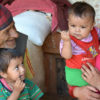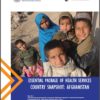Mobile Money for Health Case Study Compendium
Digital Finance, Publications, Universal Health Coverage, Where We WorkDespite the recent proliferation of mobile phone usage and uptake of mobile money in developing markets, use in the health sector remains limited and, often, has not been brought to scale. This compendium seeks to expand the knowledge base on mobile money in the health sector by drawing out trends from existing programs and examining […]





